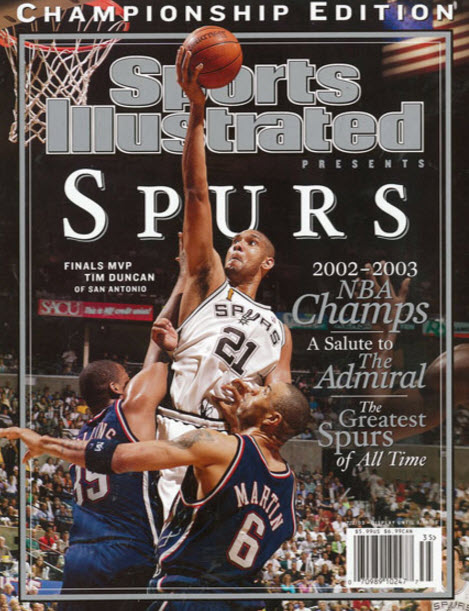6 Degrees of Leadership from Tim Duncan

As I reflect back on the San Antonio’s Tim Duncan’s career, I see six lessons that he has taught leaders.
I don’t believe he ever put these lessons into words. Instead he lived St. Francis of Assisi’s profound saying, “Preach the gospel; if necessary, use words.” His teaching legacy was his example.
RESULTS: Leaders often are judged by the results they attain for their organization. Over his 19-year career, the Spurs won 155 more games than any other NBA team. They won an amazing 71.9% of their regular season games during this time period and they never missed the playoffs. They were the winners of 5 NBA titles and he was the Most Valuable Player of the season and the Finals numerous times.
Individually, he is only the 3rd player in NBA history to score 25,000 points and grab 15,000 rebounds. He was at his best when his best was needed most. During the playoffs, he was 1st in the number of double doubles; 2nd in most playoff wins; and 3rd in most rebounds. Many consider him to be the best power forward in NBA history, as well as one of the top 5 players ever to play. Minimally, he is in  everyone’s top 10.
everyone’s top 10.
Duncan achieved results for his individual body of work, but more importantly, he brought his small-market team to an elite status in the NBA.
Great leaders get results.
THINKER: Bruce Bowen, a Duncan teammate and current ESPN analyst, calls Duncan a “Thinker.” The position that usually knows the responsibilities of every player on the floor is the point guard. However, Bowen says that it was Duncan, a big man, who constantly was teaching his teammates their roles.
I believe great leaders are thinkers. They know the nuances of their organization and have the ability to teach their colleagues their roles.
CONSTANT IMPROVEMENT: Duncan did something that no 1st picks in the NBA draft ever do. He played in the NBA Summer League prior to his rookie season.
This is usually below the status of the first pick in the draft, but Duncan wanted to be as prepared as possible for his first NBA season. Despite a great college career, he knew he had to improve his game to be a factor in the NBA.
His desire to improve stayed with him throughout his career. After winning the NBA title and being named the MVP of the Finals, he contacted a coach who was considered to be the best teacher of big men in the country, the late Pete Newell.
The best big men to play in the NBA over the past thirty years had one thing in common – they all attended Newell’s Big Man Camp. Duncan, the Finals MVP, contacted Newell to help him with footwork in the post and passing out of the post.
Duncan was known as “The Big Fundamental.” Despite being the best player in the Finals, he wanted to improve his footwork and his passing, two rather elementary fundamentals in the mind of those who do not know the game.
When some leaders in their profession achieve the heights that Duncan achieved in his profession, they would never consider looking to improve their fundamentals. That would be beneath them. But Duncan sought improvement when he was at the top of his game.
HUMILITY: It was never about him; it was about the organization. When he entered the League, the Spurs were David Robinson’s team and Duncan embraced that fact. Then when it became his team, he shared the leadership with Tony Parker and Manu Ginoble. In fact, it was his team, but he believed in shared leadership. In his later years, he accepted the leadership of a player who was in 6th grade when Duncan entered the NBA – Kawhi Leonard. It was now Leonard’s team and Duncan won an NBA title as part of Leonard’s team.
Duncan won three NBA titles in three different decades because he never let the team be “his” team. He was the leader but it was all about the team, not him. Too often leaders think it is, in fact, about them. They believe the organization would not achieve without their leadership. They are indispensable!
Duncan led with humility for 19 seasons. And his retirement confirmed his humility. It had no fanfare, no hoopla; it was simply a press release from the Spurs saying Tim Duncan retired.
PREPARATION: David Robinson said Duncan was prepared for every practice. Unlike the famous Allen Iverson quote disparaging the importance of practice, when he sarcastically said, “Practice, it’s only practice,” Duncan was ready everyday for practice. Robinson said he was “reliable everyday and intense and focused.”
Michael Jordan was the same way. He worked harder in practice than all of his teammates. When a new player came to the Bulls, Jordan would actually get all over him in his first Bulls practice to let him know that when you are a part of the Bulls, you work hard every practice.
Duncan believed in the 5P’s – “Proper Preparation Prevents Poor Performance.” Great leaders lead with the 5P’s.
THE QUIET MAN WHO SAID SO MUCH: We had a great doctor in Joliet who lived his life like Duncan. In the eulogy for Dr. Gene Curran, the priest called him “The quiet man who said so much.” That was Tim Duncan. And that is Greg Popovich. He, too, never has sought the spotlight and maybe that is the reason why David Robinson says the two of them had “synergy. They always stayed on the same page.”
We actually know very little about Duncan because he shunned the spotlight. He never let it be about him. It was always about the Spurs.
This quiet, humble super star taught us a great deal about leadership without words!

Really well done, Pat.